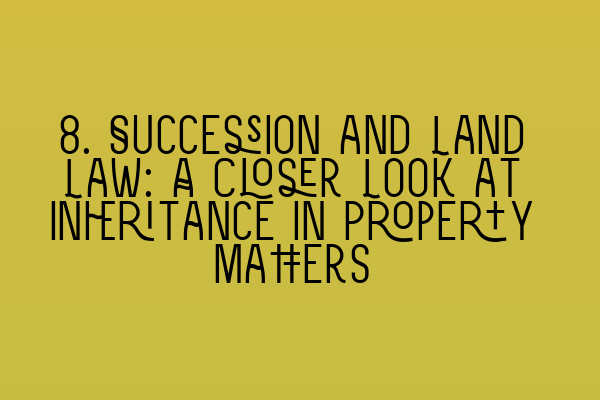**8. Succession and Land Law: A Closer Look at Inheritance in Property Matters**
Welcome to another informative blog post by SQE Property Law & Land Law. In this article, we will delve into the intriguing realm of succession and land law, exploring the intricate relationship between inheritance and property matters. Whether you are a law student preparing for the SQE exams or a curious individual seeking knowledge in this area, this post will equip you with valuable insights. Before we begin, if you’re interested in testing your knowledge with SQE 1 practice exam questions or exploring SQE 2 preparation courses, be sure to check out the related articles linked below.
Inheritance laws play a vital role in determining how property is transferred from one generation to the next. Understanding the legal framework surrounding succession is essential for legal professionals and property owners alike. Let’s explore some key aspects of succession and land law:
**1. Intestate Succession**
Intestate succession occurs when a person dies without leaving a valid will. In such cases, statutory rules come into play to determine how the deceased’s property will be distributed. These rules prioritize close relatives, such as spouses, children, and parents. It is crucial for property owners to understand the implications of intestate succession and consider drafting a will to ensure their wishes are fulfilled.
**2. Testamentary Succession**
Testamentary succession refers to the distribution of property as specified in a valid will. In this scenario, the testator has the freedom to allocate their assets to chosen beneficiaries, which may include relatives, friends, or even charitable organizations. Drafting a will that accurately reflects your intentions requires knowledge of the legal requirements and considerations involved, such as the formalities for execution and revocation.
**3. The Role of Executors**
Executors are appointed individuals who carry out the wishes of the testator. Their responsibilities include managing the deceased’s estate, paying off any outstanding debts or taxes, and distributing the assets as directed in the will. Executors must act diligently and in accordance with the law, as any breaches of fiduciary duty can result in legal consequences. It is common for executors to seek legal advice to ensure they fulfill their obligations correctly.
**4. Inheritance Tax**
Inheritance tax is a financial consideration that arises upon the transfer of property through inheritance. It is important to have a thorough understanding of the inheritance tax laws to minimize potential liabilities and secure the financial future of the beneficiaries. Seeking guidance from tax experts and solicitors well-versed in inheritance tax planning is advisable to navigate this complex area effectively.
**5. Trusts and Property**
Trusts are frequently utilized in estate planning to protect assets and facilitate smooth property transfer. They allow property owners to set aside assets for designated beneficiaries, providing them with certain protections and potential tax advantages. Understanding the different types of trusts and their implications is crucial, both for property owners and legal professionals advising clients on effective estate planning strategies.
**6. Co-ownership and Succession**
Co-ownership of property raises specific considerations in the context of succession. Joint tenancy and tenancy in common are common forms of co-ownership, each with their own legal consequences regarding the transfer of property upon death. It is crucial that co-owners understand the implications of their chosen form of co-ownership and consider how succession will be handled to ensure their intentions are met.
**7. Land Registration**
The process of land registration is also intertwined with inheritance matters. Understanding the legal requirements and procedures for transferring registered land is essential for solicitors dealing with probate cases. An accurate and up-to-date register of property ownership helps streamline the transfer of property, ensuring compliance with legal formalities and minimizing potential disputes.
**8. Seeking Legal Advice**
Navigating the complexities of succession and land law can be daunting. It is highly recommended to consult experienced solicitors who specialize in property law and inheritance matters. Solicitors with in-depth knowledge of estate planning, will drafting, and probate can provide valuable guidance, ensuring that property owners’ intentions are preserved and their loved ones’ interests are protected.
In conclusion, the interplay between succession and land law is a fascinating aspect of legal practice. Whether you are a law student preparing for the SQE exams or a property owner interested in estate planning, understanding the intricacies of inheritance in property matters is crucial. By familiarizing yourself with the legal principles and seeking professional advice when needed, you can navigate this complex area confidently and ensure the smooth transfer of property according to your wishes.
We hope this article has shed light on the importance of succession and land law in relation to inheritance. Don’t forget to explore our related articles on SQE 1 practice exam questions, SQE 2 preparation courses, and other valuable resources.
